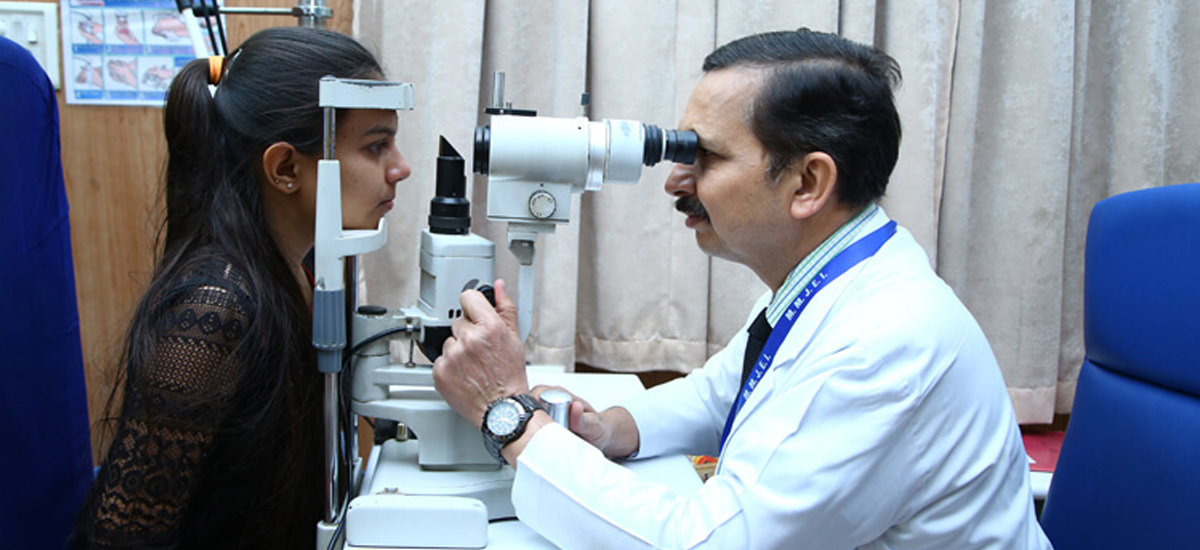Advanced Solutions for Corneal Disorders and Refractive Errors

Comprehensive Cornea Services
At M M Joshi Eye Institute, our Cornea Surgery and Treatment services offer a wide range of advanced solutions for refractive errors, corneal diseases, and injuries. With cutting-edge technology and expert care, we treat complex corneal conditions, ensuring optimal vision outcomes for our patients.
Refractive Services
We specialize in treating all types of refractive errors, including myopia, hyperopia , and astigmatism. Evaluations are conducted using the latest topography machines, and treatments are performed with state-of-the-art Femtosecond lasers and precise Excimer lasers, along with Smart Pulse technology, ensuring accurate and effective results.
Cornea Clinic
Our Cornea Clinic provides specialized care for various corneal disorders, including:
- Corneal Ulcers
- Keratoconus
- Ocular Trauma
- Chemical Injuries
- Dry Eye and Surface Disorders
- Ocular Surface Squamous Neoplasia (OSSN): Conjunctival and corneal surface tumors.
Contact Lens Clinic
We offer a variety of contact lens solutions, including:
- Corrective Lenses: For common refractive errors.
- Advanced Contact Lenses: Such as Rose K and Scleral lenses for treating Keratoconus.
Cosmetic Contact Lenses
Coloured lenses for aesthetic enhancement.
Advanced Equipment for Corneal Surgery
Our cornea department is equipped with cutting-edge instruments to ensure precise diagnosis and treatment, including:
- Sirius Tomographer: A state-of-the-art machine for corneal shape evaluation, including aberrometry, pupillography, and meibography.
- Tomey Specular Microscope: For detailed evaluation of the corneal endothelium.
- Optovue Optical Coherence Tomographer (OCT): Provides high-resolution 2D and 3D cross-sectional imaging of the anterior segment and retina.
- Haag Streit Slit Lamp Photographer: For thorough documentation of corneal, ocular surface, lens, and iris disorders.
Corneal Surgeries and Procedures
Our cornea team is proficient in performing major and minor surgical procedures, ensuring comprehensive treatment for various corneal conditions.
- Refractive Surgeries: Including Bladeless LASIK (FEMTO LASIK), traditional LASIK, Trans PRK (No-Touch Advanced Surface Ablation), and Phakic IOLs (ICL, IPCL).
- Corneal Transplantation: Full-thickness (PK) and partial-thickness (DALK, DSEK, DMEK) corneal transplants.
- Ocular Surface Reconstruction: Procedures such as Mucous Membrane Grafting (MMG),Amniotic Membrane Transplantation (AMT), Simple Limbal Epithelial Transplant (SLET), and treatments for Symblepharon and OSSN.
- Corneal Collagen Cross-Linking (C3R): For the treatment of Keratoconus.
- Corneal Ulcer Management: Using glue, patch grafts, and intrastromal or intracameral antibiotics.
- Cosmetic Corneal Tattooing: For enhancing corneal aesthetics.
- Corneal Degeneration Management: By EDTA chelation and scraping, with bandage contact lens (BCL) support.
- Superficial Ocular Foreign Body Removal: Safely removing foreign particles from the eye.
Cornea and Refractive Surgeons & Specialists
Why Choose M M Joshi Eye Institute for Cornea Care?
Book Your Corneal Evaluation Today!
If you’re experiencing any vision problems or have been diagnosed with a corneal condition, consult our specialists at M M Joshi Eye Institute for a comprehensive evaluation and personalized treatment plan.
FAQs
LASIK surgery is one of the procedures used for laser vision correction. It is done to restore vision without glasses. One has to undergo complete ophthalmological evaluation to determine the suitability for the procedure. If one’s cornea being unsuitable for the LASIK, one can always one undergo ICL(Implantable collamer lens) to get read of the glasses . However, with the advanced technologies and clinical expertise, the rate of complication is substantially less.
Cornea is the transparent structure that covers the front of the eye and allows light to enter and get focussed inside the eye. If the cornea gets damaged the transparency reduces leading to blurry vision. This damage can range from mild superficial scratch to an extreme of full thickness corneal damage . In case of mild scratch, the cornea heals well without a permanent scar. whereas an extreme corneal damage, heals with a permanent scar. This scarred cornea can however be treated with PTK (phototherapeutic keratectomy) or can be replaced with a clear corneal tissue acquired from the eye donated after death.
Cornea being a very sensitive structure, any injury to cornea even a speck of dust causes pain, redness and increased sensitivity to light. If the injury is superficial it may heal without the loss of corneal transparency but if the injury is deep it may cause scar and loss of corneal transparency leading to reduce vision. This may need replacement of the damaged cornea with a clear cornea acquired from donor. One must consult an Ophthalmologist, preferably a Cornea specialist in the presence of any of these signs.
The level of vision loss depends on the severity of damage to the cornea. In case of mild injury, one may develop a blurry vision, whereas if the damage is more severe, it may even lead to complete loss of vision. This blindness, however, in most of the cases is treatable by replacing the damaged cornea with a clear cornea retrieved from a donor.
Depending on the level of damage, the cornea can treated. In case of a superficial damage, the cells over the cornea grow and heal and does not leave any scar. However, if the damage is deeper, the cornea may heal with a scar. This damaged cornea can be replaced by another clear transparent cornea acquired from a donor after his/ her death. Pledge for eye donation is an act of charity and is totally voluntary. Cornea is retrieved from the donor only after his/her death. It cannot be retrieved from a living person.
Cornea surgery is done for multiple indications. If surgery is done for getting rid of the glasses, the procedure is termed laser vision correction. There are multiple options available for laser vision correction like LASIK, TransPRK and SMILE. The suitability for the surgery can only be assessed by an Ophthalmologist preferably a cornea specialist. The procedure is reasonably safe and effective for cases suitable for any such surgery. If a wing like mass grows over cornea from adjacent part of eye it’s called pterygium and this mass can be safely removed from the cornea and the bare part adjacent to the mass can be covered with a graft taken from the same eye. If cornea has lost its transparency with a scar, this scarred cornea needs to be replaced with a clear cornea. This procedure is called keratoplasty. Depending on the case one may need lamellar keratoplasty where only one or two layers of cornea are replaced or penetrating keratoplasty where full thickness cornea tissue is replaced. This tissue is retrieved from a donor after his/ her death. Since the tissue is retrieved from another living being of same species it’s called allograft. This allograft is recognized as foreign tissue by the recipient body and the latter starts acting against the tissue. This process is called rejection. The risk of rejection is quite high in other organ transplants like heart or kidney and the recipient needs life-long immune suppression. Cornea fortunately has no blood vessel in it and hence the risk of rejection is extremely low as compared to other transplants. This risk is even lesser in case of lamellar keratoplasty as compared to penetrating keratoplasty.
Cornea surgery like laser vision correction has a very quick recovery period. The healing although a slow process and may take a few months this doesn’t cause any limitation for routine activities. Patient may go back to normal routine and resume outdoor activities within a week after the surgery.
Any patient in need of corneal transplant regardless of the age can undergo the surgery. The donor age may range from 2- 75 years in western countries. This upper age limit is more flexible in developing countries with lesser eye donations. The transplant is usually age matched with the donor.
Yes, damaged cornea can be replaced with another clear cornea. This procedure is called keratoplasty. The clear cornea tissue is retrieved from a donor after his/her death. Depending on the severity of the damage, either a layer or full thickness cornea can be replaced. For cases where keratoplasty is not successful or not advisable, artificial cornea or keratoprosthesis (Kpro) can be used to replace the damaged cornea.
Cornea replacement is only through a donor. Cornea is retrieved from a donor who has pledged to donate his eye, and the surgery is performed with the same philanthropic sentiment as the person donating the eye. Even the operating surgeon may not charge for his skill. However, the cornea transplant requires consumables like the media used for preserving the retrieved corneal tissue and surgical instruments which are costly. As compared to the developed nations where the cost of cornea transplant ranges between 1.5 lac -20 lacs INR, cost of cornea transplant in India is much cheaper ranging from 10, 000- 75, 000 INR depending on the type of procedure and complexity of the surgery
Depending on the age and health of the donor tissue, the “warranty” of the tissue decreases with time. Hence, the cornea transplants are usually age matched for donor and recipient. If old age donor tissue is transplanted in a young recipient, the likelihood of the graft failure increases. Besides the failure due to health and age of the donor, the failure can also be caused by the rejection. Since cornea tissue is retrieved from another human body, the recipient body fails to recognize it as its own tissue and hence may start acting against it, this is called graft rejection. This is however, less common in case of cornea transplant. Corneal transplants unlike other organ transplants doesn’t require lifelong immunosuppression. In case the graft fails, transplant can be repeated multiple times as long as there is a reasonable chance of success and the eye can tolerate additional procedures.
While the Cornea transplant procedure is considered safe, there is a risk of allograft rejection and graft failure. Besides, in some patients, there may be refractive error, glaucoma, cataract formation or risk of graft infection in the eye.
The healing after any laser vision usually occurs withins days to couple of weeks & doesn’t cause any limitation for routine activities. Patient may go back to normal routine and resume outdoor activities within a week after the surgery
LASIK involves microchiseling the surface of the cornea to treat the refractive error. Cornea is prolate in shape like a rugby ball. In case of myopia (far sightedness), this laser is used to flatten the central cornea making it oblate and in case of hypermetropia (near sightedness), it flattens the mid -peripheral cornea thereby steepens the central cornea or makes it more prolate. This procedure is similar to sculpting a stone into various shapes. During this procedure, cornea tissue in the order of micron (1/1000th of a mm) is removed. For correcting 1 Dioptric power of glass prescription almost 14 microns of tissue is removed. This approximates to even less than 1/5th of a normal corneal thickness and can be very safely removed from a healthy cornea with negligible risk.
No, LASIK surgery is not painful. This procedure takes a few minutes and is carried out without any injection, with the use of topical anesthetizing drops only. This drop makes whole procedure comfortable for the patient. The mild pain after surgery is taken care of by the eyedrops and painkiller tablets.
Usually people under 18 years of age are not considered suitable candidates for laser vision correction as the refractive error is usually unstable. Although there is no upper age limit for surgery, people above 45 years of age tend to develop presbyopia which calls for the need of near vision correcting glasses.
Depending on the type of procedure, surgical equipment and the institute the cost may range from 50, 000- 1.5 lacs INR.
LASIK is one of the surgeries performed for laser vision correction. This surgery makes the patient spectacle independent. Majority of people who undergo LASIK don’t need glasses after surgery. LASIK may not correct presbyopia. Above 45 years of age, reading glasses are often necessary even for people with excellent distant vision.
One may experience glare, halos and starbursts after LASIK making driving at night difficult for few people. This temporary effect is normal and usually resolves over a period of 1-3 months but with the advent of newer technologies and wavefront technology these are often taken care at the time of surgery only.
There is no contraindication for using mobile phone after surgery but usually immediately after surgery for a week the vision may be blurry and eyes may me more sensitive to light which can make mobile phone use difficult.
LASIK surgery per se doesn’t cause any long- term side effects.There can be dryness of eyes for initial 1-3 months after surgery which doesn’t affect routine activities and can easily be taken care of using lubricating eyedrops prescribed after surgery. LASIK involves sculpting of the corneal surface to correct the refractive error. In this process, very miniscule tissue of cornea is removed from the surface. In cases suitable for laser vision correction, this minute tissue reduction measured in 1/ 1000 of a mm rarely causes any long-term alteration in the shape of the cornea. However, cases who undergo this procedure despite the risk, may develop bulging of the cornea called ectasia. This ectasia again is treatable.
Immediately after surgery for a period of a week, there may be increased sensitivity for light for which one is advised to wear sunglasses outdoors. There is no need to wear sunglasses indoors.



